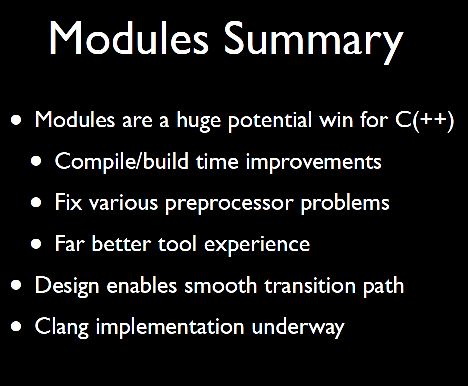Earlier this month, Doug Gregor gave a presentation on Modules at the November 2012 LLVM Developers' Meeting. Doug is lead Clang developer at Apple, chairs the WG21 Study Group on Modules (SG2), and in this talk reports his design goals and partial progress to date on designing and implementing a module system for C++. This talk is an extended version of the presentation Doug made at the Feb 2012 ISO C++ meeting in Kona.
The talk slides and video recording is available via the 2012 DevMeeting page.
Standardization note: SG2 was formed in February and has been relatively quiet as a handful of experts (notably Doug with Clang) make further progress on proof-of-concept designs and implementations. As this prototyping work coalesces, SG2 is expected to become active early in the new year.
Modules (MP4 video) (PDF slides)
Doug Gregor -- Apple
The C preprocessor has long been a source of problems for programmers and tools alike.
Programmers must contend with widespread macro pollution and
#include-ordering problems due to ill-behaved headers. Developers habitually employ various preprocessor workarounds, such asLONG_MACRO_PREFIXES,#includeguards, and the occasional#undefof a library macro to mitigate these problems.Tools, on the other hand, must cope with the inherent scalability problems associated with parsing the same headers repeatedly, because each different preprocessing context could effect how a header is interpreted -- even though the programmer rarely wants it.
Modules seeks to solve this problem by isolating the interface of a particular library and compiling it (once) into an efficient, serialized representation that can be efficiently imported whenever that library is used, improving both the programmer's experience and the scalability of the compilation process.


Add a Comment
Comments are closed.